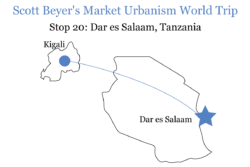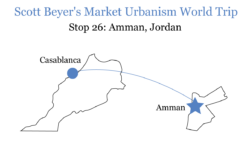Tribalism And Urban Development: A Rough Mix
Lack of formal land ownership and tribal tradition pose challenges for property rights and development in the Third World
Much of the Third World, namely Africa and the Middle East, is organized along tribal lines. It still dictates a population’s food, language, livelihood, and even the markings on their faces. Tribalism also means that populations have fixed ideas about who owns land and how it should be used. This traditional means of landholding has increasingly conflicted with development pressure – as governments dispute the informal land claims that tribes make.
Many disputes relate to conservation. African governments have sought to protect land from urban sprawl, outside investor speculation, and wildlife poaching. So they establish protected areas. But some areas have long been occupied by tribal settlements, and that’s where the conflict surfaces.
One example of a tribally-organized African society is the Maasai. They’re prominent in Tanzania, where they participate in agrarian livelihoods, or otherwise take odd jobs like retail security. They’ve faced pressure from Tanzanian authorities to leave their land.

In the early 1950s, according to Human Rights Watch, authorities granted the Maasai inhabitants of the Ngorongoro region “the right to live and graze their herd.” Despite this agreement, land used by the tribe has been targeted for conservation. These decisions have come without warning, HRW reports, noting one incident where police entered Maasai territory within two days of establishing a conservation measure; shortly thereafter, tribal reps were arrested.
In a 2017 incident, authorities deemed hundreds of Maasai homes illegal and burned them. Four years later, several institutions, including churches and medical facilities, were condemned and destroyed. Such conflicts between tribes and authorities have gotten violent, and numerous Maasai fled to other countries.
During my stay in Dar es Salaam, Tanzania’s largest city, the potential for conflict seemed apparent. The Maasai camped in select woodlands throughout my neighborhood, as signs advertised those lots for future development. The city’s mix of agrarian and urban lifestyles made such cultural clashes inevitable, and the Maasai seem to bear the brunt of it.
In Kenya, the government has also used the preservation argument to take land from tribes. It condemned settlements held by the Ogiek and Sengwer peoples. HRW claimed that by 2021, the government had evicted 50,000 families from the Mau forest.
“As a hunter-gatherer community,” writes Amnesty International, “the Ogiek have for centuries depended on the Mau Forest for their residence and as a source of livelihood.”
In another instance, tribal land in South Africa has been eyed for an Amazon development. The Khoi and San tribes have resided on parcels near the Cape of Good Hope for centuries after having repelled a Portuguese invasion. Amazon wants to build a large campus there. The tribe argued that the development was an affront to their traditions, and raised concerns about further water pollution. They argued it was reminiscent of past infringements under colonial rule, when recreational parks were established for European settlers. Local authorities countered that the property was ill-maintained by the tribe.
This year, courts ruled that the project didn’t violate residents’ property rights, and Amazon is moving forward.
Similar conflicts play out in the Middle East. In Israel’s Negev region, the historically nomadic Bedouin have established settlements to grow crops and build homes. Israeli authorities argue that they are doing so on state land, and have cleared their settlements. As academic Ron Morad writes, “Bedouin, as semi-nomadic people, strive for decentralization and dispersion: they live in tents and make-shift structures and tend to spread out their tribes and families over large swaths of land.”
But Israel’s government desires population settlements to be concentrated. In 2022, the Israeli government approved a redevelopment plan to accommodate Bedouin settlers, forbidding them from establishing unpermitted settlements and using government-owned land for agriculture.
In Syria, Bedouin populations had some property rights under French rule. But these were repealed during independence, and now some settlements have been removed.
The issue of tribal and indigenous land fights is a global one – including in the U.S. We have a sordid history of driving natives off their land, causing some activists to claim that all our nation’s land has been “stolen”. Of course, before European colonists arrived, there was lots of land theft between native tribes. Not one of them could reasonably claim a “right” to it – other than squatters rights – and ownership was often determined through war.

The Third World still deals with such drama, because there aren’t systems to determine land titling and property rights. A major share of Africa’s land is in government hands, making it subject to power grabs and political turmoil. Middle Eastern land is sometimes owned by royals, making it vulnerable to arbitrary changes.
Formalizing land ownership, which has brought economic stability to the U.S., may someday do the same in the Third World. South Africa has taken steps in this direction; a 2018 land reform gave farmers deeds, though it gave assurances to one tribe that their land wouldn’t be taken. But not all parties will ever be completely happy, since Third World tribalism is complex, disputes date back centuries, and attitudes about who owns what are fixed.
Graphic Credit: The Market Urbanist.
Catalyst articles by Scott Beyer | Full Biography and Publications
